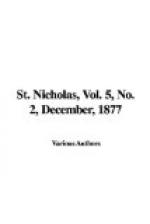Would the readers of ST. NICHOLAS, who are all admirers of Miss Louisa Alcott, like to hear more than they now know about this kind friend of theirs, who has been giving them so much pleasure by her stories, and never writes so well as when she writes for boys and girls? Then, let me tell you something about her own family and childhood, and how she became the well-known writer that she is. She not only tells you pleasant stories about “little women” and “old-fashioned girls,” “eight cousins,” and children “under the lilacs,”—but she shows you how good it is to be generous and kind, to love others and not to be always caring and working for yourselves. And the way she can do this is by first being noble and unselfish herself. “Look into thine own heart and write,” said a wise man to one who had asked how to make a book. And it is because Miss Alcott looks into her own heart and finds such kindly and beautiful wishes there that she has been able to write so many beautiful books. They tell the story of her life; but they tell many other stories also. So let me give you a few events and scenes in her life, by themselves.
Miss Alcott’s father was the son of a farmer in Connecticut, and her mother was the daughter of a merchant in Boston. After growing up in a pretty, rural town, among hardy people who worked all day in the fields or the woods, and were not very rich, Mr. Alcott went down into Virginia and wandered about among the rich planters and the poor slaves who then lived there; selling the gentlemen and ladies such fine things as they would buy from his boxes,—for he was a traveling merchant, or peddler,—staying in their mansions sometimes, and sometimes in the cabins of the poor; reading all the books he could find in the great houses, and learning all that he could in other ways. Then, he went back to Connecticut and became a school-master. So fond was he of children, and so well did he understand them, that his school soon became large and famous, and he was sent for to go and teach poor children in Boston. Miss May, the mother of Miss Alcott, was then a young lady in that city. She, too, was full of kind thoughts for children, the poor and the rich, and when she saw how well the young school-master understood his work, how much good he was seeking to do, and how well he loved her, why, Miss May consented to marry Mr. Alcott, and then they went away to Philadelphia together, where Mr. Alcott taught another school.
Close by Philadelphia, and now a part of that great city, is Germantown, a quiet and lovely village then, which had been settled many years before by Germans, for whom it was named, and by Quakers, such as came to Philadelphia with William Penn. Here Louisa May Alcott was born, and she spent the first two years of her life in Germantown and Philadelphia. Then, her father and mother went back to Boston, where Mr. Alcott taught a celebrated school in a fine large building called the Temple, close by Boston Common, and about




